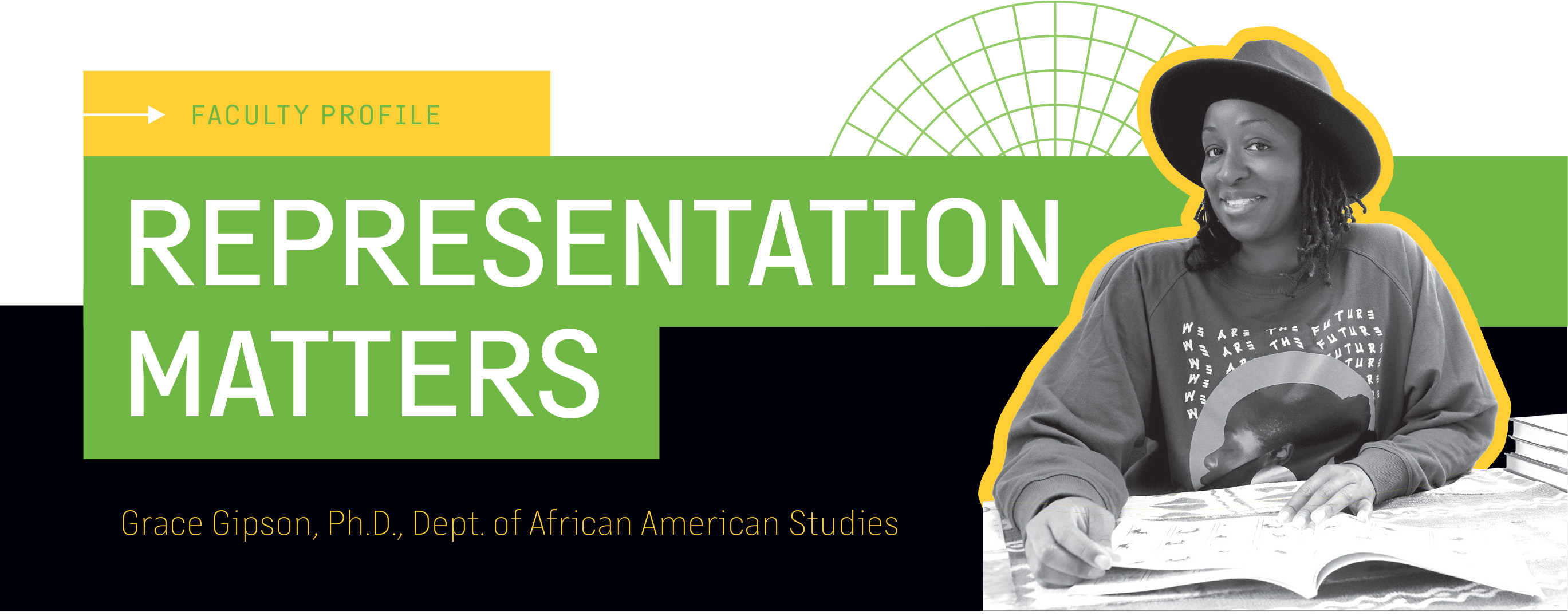
Representation matters
Who is the smartest person in the Marvel Universe? Grace D. Gipson, Ph.D., a pop culture scholar and Black future feminist who studies representation around race and gender in comic books, music, film and television, knows the answer: Her name is Lunella Lafayette, aka Moon Girl, and she’s “a 9-year-old Black girl super genius.”
The release of blockbuster superhero films centered around Black protagonists, including Marvel’s “Black Panther” in 2018 and its sequel in 2022, reignited conversations about the importance of representation in Hollywood and pop culture, something Gipson studies as an assistant professor in the Department of African American Studies.
“Representation is essential and important because what we see in pop culture influences and offers us a viewpoint into how we make decisions, how we view things, the way in which things are portrayed and people are portrayed,” Gipson said. “If there’s a limited view of Black girls and women (in pop culture), then there’s going to be a limited viewpoint as far as how we exist (in society).”
Gipson studies Afrofuturism, a framework for imagining Black futures and redefining the experience of people in the African diaspora through science, technology and the arts, at its intersection with pop culture. She explores fantasy, fiction and pop culture’s inescapable influence on society and vice versa.
“Narratives like Lunella’s within the comic book genre are not only notable, but crucial because they aid in creating a bridge between the gap of fiction and real-world application,” Gipson wrote in a 2017 column, “The Future Is Black and Female: Afrofuturism and Comic Books,” for the African American Intellectual History Society. “In addition to bringing awareness to the insufficiencies in STEM, the character also exhibits a humanized experience of young Black girls while also celebrating their intelligence.”
“Representation is essential and important because what we see in pop culture influences and offers us a viewpoint into how we make decisions, how we view things, the way in which things are portrayed and people are portrayed," Gibson said.
Gipson’s research on representation in pop culture sprang from her natural curiosity about the world — and from an early love of comics, comic books and cartoons. She began reading “the funnies” in her grandmother’s newspaper at age 4 and, in elementary school, turned to comic books. She saw herself in Storm, a Black woman superhero, from “X-Men.”
While pop culture plays a role in creating and reinforcing stereotypes, which can be harmful when it comes to bias in society, it can also be a teaching tool to help people explore their biases. Gipson said 2018’s hit film “Black Panther” did just that. It changed the perceptions of all viewers — whether they looked like the cast or not — on everything from body image to leadership to race and gender generally.
“Black Panther” changed how Black girls and women see themselves on screen, according to Gipson, emphasizing the positive impacts of representation in fiction. The film, she says, “put #BlackGirlMagic on the map,” encouraging Black women to further celebrate themselves as leaders on social media, and redefined how Black women are personified in film, from hairstyles and costumes to roles as leaders in politics and technology.
“I’m a huge movie buff, and being able to see new genres explore Black cultural experiences, from religion to fantasy like with ‘A Wrinkle in Time’ and ‘Honk for Jesus. Save Your Soul.’ — there are so many more genres now that are engaging with the Black experience, in the Black diasporic experience, I’m always going to have hope that representation is going to be there and that the film industry is changing.”